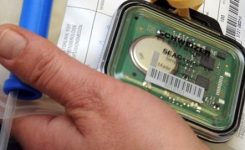
German logistics company uses RFID temperature recording tags to track medicines
[ad_1]
Time: 2011 Location: Germany
User: DB Schenker Label Type: High Frequency
Operating frequency: 13.56 MHz Standard: ISO 15693
Implementing company: Global International Freight Company Solution Provider: Global International Freight Company
Hardware Provider: Schweizer Electronic
The German logistics service provider DB Schenker uses RFID to track and monitor the environment in which medicines and reagents that are sensitive to the storage environment are transported to the United States.
German logistics giant DB Schenker uses RFID tags with temperature recording functions to track and monitor the environment in which sensitive medical supplies are transported to the United States. This temperature tracking application is used to transport RFID-tagged products by air, sea, land, and rail.
Eleftherios Skountridakis, the person in charge of the RFID project implementation of DB Schenker in Germany, said: The temperature tracking project implemented for air transport uses 350 battery-assisted passive tags, which can be reused. The project was initially piloted in January 2010, and continued to conduct continuous technical testing until October. Most labels are used to track goods sent from the DB Schenker warehouse in Mannheim, and are controlled between 2 degrees and 8 degrees (35.6~46.4 degrees Fahrenheit), or between 15 degrees and 25 degrees Celsius ( 59~77 degrees Fahrenheit).

Temperature record label
Skountridakis said: “Research shows that this solution is the best from the perspectives of pricing, calibration and battery life.” We modified this labeling software to make it compatible with the company’s database. The company’s application provides more detailed technical support. Each label includes a small LED light, if the temperature exceeds the pre-specified range, the LED flashes red multiple times. If the temperature stays within the predetermined range, the indicator light flashes green once every six seconds. The inductive tag is a 13.56 MHz high frequency (HF) tag, manufactured by Schweizer Electronic in Germany. The memory of these tags can reach 60 kilobytes and conforms to the ISO 15693 standard. Each label has a 16-bit code composed of alphanumerics. These codes are unique, printed on the outside of the label and can be used as a bar code.
DB Schenker and its customer (a global pharmaceutical company, without revealing the company’s specific name) jointly decide which of the goods shipped to the United States need to be monitored, and the temperature during its transportation is controlled within the above two ranges. The selected goods are often reagent solutions in glass bottles used to identify diseases. As part of the company’s quality control measures, company customers are using RFID temperature tags to monitor the temperature of shipments, and these measures are in line with U.S. Food and Drug Administration (FDA) regulations.
[ad_2]



